Motherless Children Teach this Volunteer a Lesson in Love
Jack Bryan, Global Volunteers Digital Media Coordinator, said he learned a lesson on “mothering” in Peru he couldn’t have learned anywhere else. Read his compelling story here:
Abraham Lincoln
“All that I am, or hope to be, I owe to my angel mother.”
A growing body of scientific evidence reveals the extent that a mother’s love determines the emotional and biological development of her child’s brain and nervous system. In short, it has been found that a mother’s love has far-reaching effects on her child’s ability to love and learn throughout life.
My mother’s presence in my life has definitely been a positive one. She’s always been there to feed me when I’m hungry, console me after heartbreak, and kiss my wounds after I’ve fallen. I cannot imagine where I’d be without her and who I’d be if not for her hand on my shoulder as I grew up. But not everyone is afforded the luxury of a mother’s supportive smile, purposeful discipline, and gentle molding. Many children walk through life without a mother’s footsteps beside theirs. I met hundreds of such children during my Global Volunteers service program in Peru.
Our team of volunteers was composed of people from across the nation; from New York to Minnesota to California. On weekday mornings, lively conversation filled the large van that took us to Sagrada Familia (Sacred Family), the community project where Global Volunteers serves. Some mornings, if I was tired, I would turn my head, rest my cheek on the seat, and stare out the window into Ventanilla, one of Lima’s poorest districts. Rolling pale grey hills that extended to the horizon were punctuated by small colorful houses. In a weird way, it reminded me of confetti cake.
” I wondered – who loves them?”
The drive was always surprisingly short. As the van rolled through the front gates of Sagrada Familia, the community seemed to slow down momentarily. Brooms stopped sweeping, soccer balls were held, heads turned, and a smattering of children ran up to the van to greet us with a hug and “¡buenos días!” (good morning!). Looking up to us with sparkling eyes were only a handful of the hundreds of motherless children who live here. The motto of Sagrada Familia is this: Love yourself well, Learn well, Do it well, Live well. The children are taught to love themselves, but without a mother’s love, or a father’s for that matter, I wondered – who loves them?
Though they are without parents, they experience various forms of support from the adults who work at Sagrada Familia. Lily, the community’s coordinator, who is beyond busy, often stops between meetings to chat with groups of kids along the path. I watched as she playfully conversed with them, always leaving the group chuckling.
At the end of the dirt path that extends through Sagrada Familia is the dining hall and kitchen. There I find a determined woman, Elizabeth, who leads the intimidating task of feeding these many mouths every day – breakfast, lunch, and dinner. Wow. After cooking the food over a fire in enormous pots and serving everyone, she’ll sometimes walk around nagging at the kids to talk less and eat more or encouraging them to go back to get more rice. If that’s not motherly love, then I don’t know what is.
It’s natural for some to offer their affection to those around them who need it. But even their love must be stretched pretty thin to impact the hundreds of children who traverse the campus. “What’s an alternate source of love for children with half-full love tanks?” I wonder. The answer comes to me: Us. Volunteers.
I asked Miguel, the founder of Sagrada Familia, if volunteers impact children in the way I was imagining. His reply [translated]:
“We are living in a world where solidarity has taken last place. We put wars and personal appetites first. . . We only remember about love on Christmas.
A volunteer is different. S/he is a human being who comes and gives without asking anything in return. And this is what they should learn. The meaning of volunteering is what we want for the lives of the children. . . The policy of the beggar is not good, or the policy of waiting. We have to give. And we have to give it all. That’s what volunteers do. They give one week, one day, one hour. That’s important.
And the children see this.”
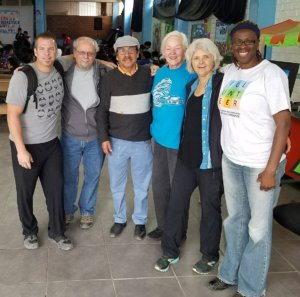
“The children see this.”
Our presence at Sagrada Familia not only shows the children that adults care about them, but also that there are people willing to travel across the world just to be with them, to talk with them, to teach them. Miguel’s favorite part about having volunteers in his community is that they set a positive example for the children. In addition to teaching them and caring for them, we volunteers set an example for them and in our own way, provide our motherly love to them. What we may not expect is the love we receive in return. Below are some words I shared at our last lunch with the children:
“I came to Sagrada Familia thinking that you needed my love, but I was wrong… I needed your love. You welcomed me with hugs and kisses, and I needed that. Even though my Spanish is not great, you listened to me, and I needed that. You shared your love and friendship with me… and I will cherish it all the days of my life, and forever after.”
It turns out that a mother’s love takes many forms. It’s clearly a powerful force, a support system of friends, teachers, coordinators, cooks, volunteers – and children as well – strengthened by giving hearts, that can raise us all to be the best we can be.

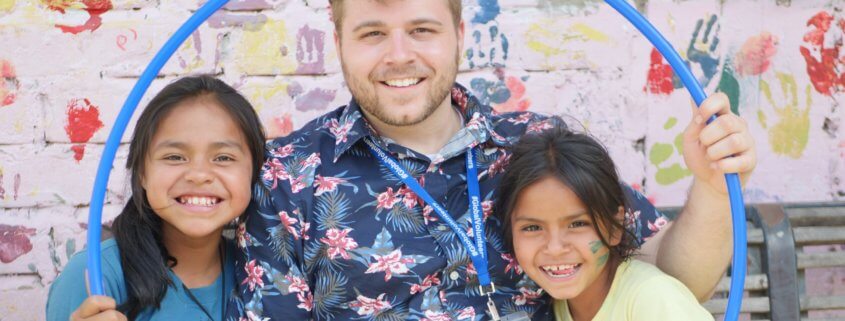
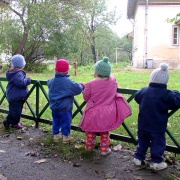
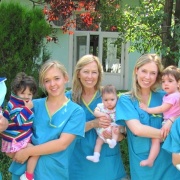
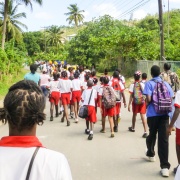
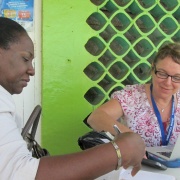
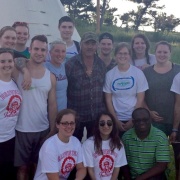
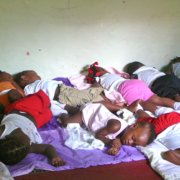
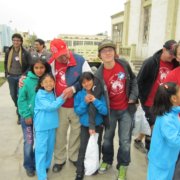
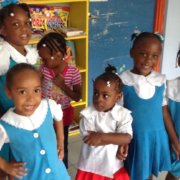


Leave a Reply
Want to join the discussion?Feel free to contribute!